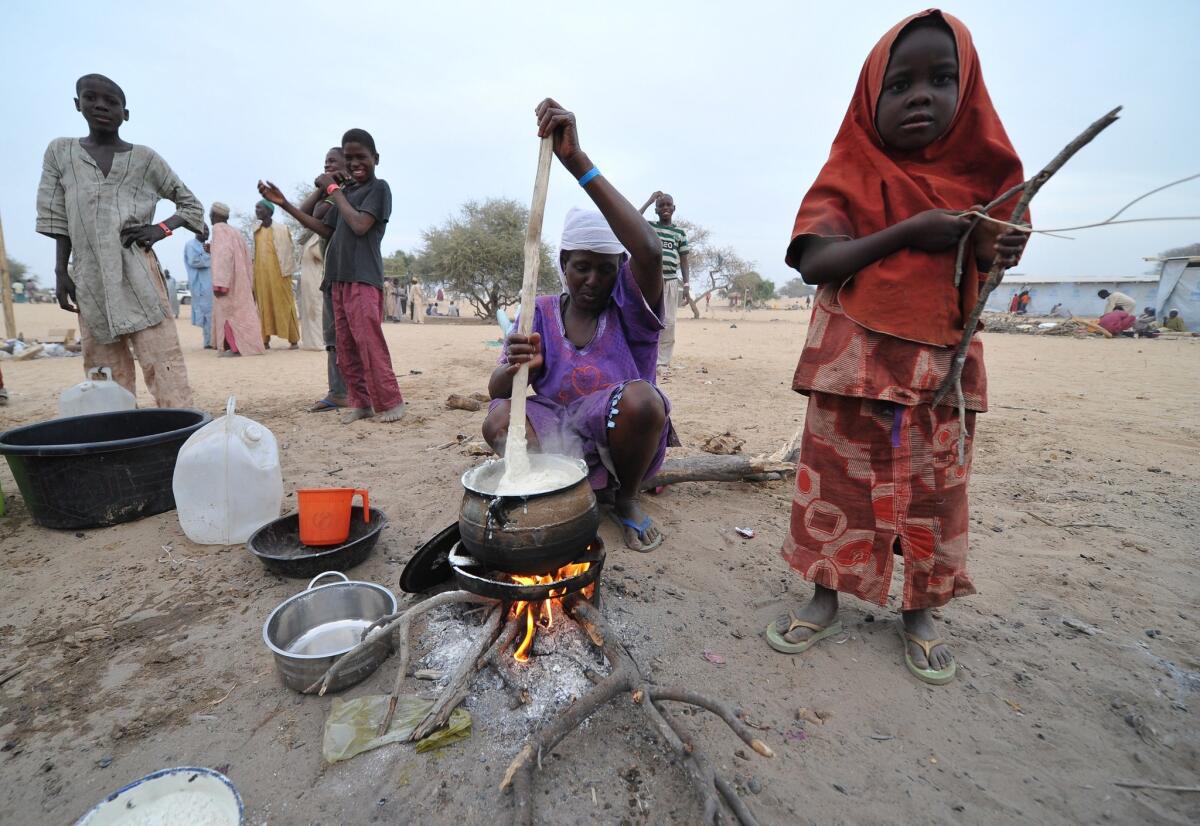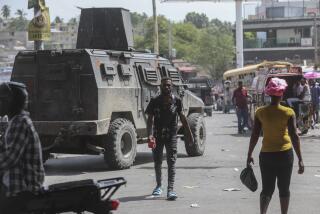African Union backs regional force to confront Boko Haram

- Share via
Reporting from Johannesburg, South Africa — An African Union summit Friday endorsed the creation of a 7,500-member African force to fight the Nigerian extremist group Boko Haram, which has threatened to spread its deadly insurgency.
Nigeria insists that it doesn’t need an outside force to combat the group, which wants to set up an Islamic caliphate. However, Nigeria’s often-outgunned military has lost control of a vast swath of the country’s northeast to Boko Haram over the last year.
Nkosazana Dlamini-Zuma of South Africa, chairwoman of the African Union’s executive commission, told African leaders at the opening of their summit in Addis Ababa, Ethiopia that a robust approach was crucial after recent attacks on Nigeria’s neighbor, Cameroon, by Boko Haram fighters.
“Terrorism, in particular the brutality of Boko Haram against our people, [is] a threat to our collective safety, security and development,” Dlamini-Zuma said. “This has now spread to the region beyond Nigeria and requires a collective, effective and decisive response.”
Boko Haram has killed thousands of civilians in Nigeria and raised its black flag over dozens of villages, in effect surrounding Maiduguri, the capital of Borno state and a major regional trade center.
Nigerian President Goodluck Jonathan, whose government has agreed to participate in the force despite its reluctance, was not at the summit. He was in Nigeria, campaigning before the Feb. 14 general elections. On Thursday, he faced protests from stone-throwing youths when he visited the eastern town of Yola, according to Nigerian news reports.
Boko Haram attacked Maiduguri on Sunday and was driven back by Nigerian forces. However, the group took control of Monguno, 80 miles to the north, seizing a military base and ammunition. It launched another attack on Maiduguri on Thursday, the Associated Press reported.
Boko Haram’s heavily armed fighters are believed to have benefited from the flood of arms from Libya into northern and western Africa after the 2011 overthrow of Moammar Kadafi.
Troops from Nigeria, Chad, Cameroon, Niger and Benin are expected to make up the bulk of the African force, which must be approved by the United Nations Security Council. The force’s duties would include rescuing the unknown number of people abducted by Boko Haram.
Boko Haram routinely abducts women and children as sex slaves and boys as fighters, according to witnesses of recent attacks. The group gained global infamy for its abduction last April of 276 schoolgirls in the Nigerian town of Chibok.
Linda Thomas-Greenfield, U.S. assistant secretary of State for African Affairs, told journalists that the United States would help the AU force. “We are prepared to provide technical support, training and equipment to fight the Boko Haram group,” she said.
U.N. Secretary-General Ban Ki-moon said at the AU summit that Boko Haram posed “a clear danger to national, regional and international peace and security. This group continues to kill Christians and Muslims, kidnap women and children, and destroy churches and mosques.”
Chad’s military, honed by battling its own rebels and seen as the most effective combat force in the region, recently deployed a force to Cameroon. Chadian forces Thursday bombed Boko Haram fighters in the northeast Nigeria border town of Malumfatori, and its ground forces drove the insurgents out Friday. The victory was seen as a sign that a regional force might help quell the insurgency.
However, the swift seizure of the town after successive defeats of Nigerian military in the region also was seen as a humiliation for Jonathan’s government.
Nigerian analysts contend that although the Nigerian military has ample resources, corruption in the upper ranks means that soldiers are left poorly equipped for fighting Boko Haram’s sophisticated weaponry.
Nigeria has arrested a group of top military officers who failed to prevent Boko Haram from conquering the northeastern town of Baga, news reports said Friday. Thousands of homes were burned and hundreds of people were killed in the attack early this month.
In December, Nigeria court-martialed 54 soldiers and sentenced them to death by firing squad for refusing in August to attack three towns held by Boko Haram.
Follow @robyndixon_LAT on Twitter for news out of Africa
More to Read
Sign up for Essential California
The most important California stories and recommendations in your inbox every morning.
You may occasionally receive promotional content from the Los Angeles Times.










